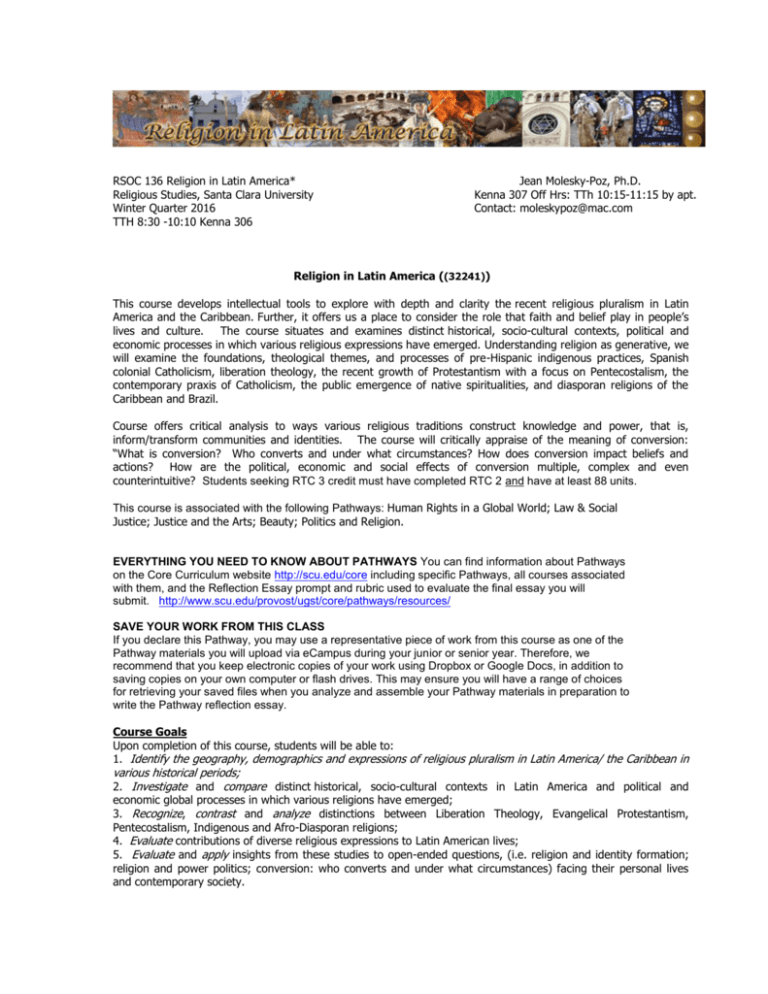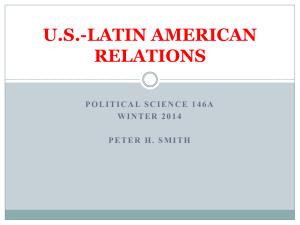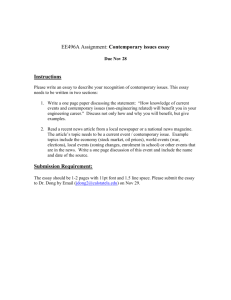Religion in Latin America
advertisement

RSOC 136 Religion in Latin America* Religious Studies, Santa Clara University Winter Quarter 2016 TTH 8:30 -10:10 Kenna 306 Jean Molesky-Poz, Ph.D. Kenna 307 Off Hrs: TTh 10:15-11:15 by apt. Contact: moleskypoz@mac.com Religion in Latin America ((32241)) This course develops intellectual tools to explore with depth and clarity the recent religious pluralism in Latin America and the Caribbean. Further, it offers us a place to consider the role that faith and belief play in people’s lives and culture. The course situates and examines distinct historical, socio-cultural contexts, political and economic processes in which various religious expressions have emerged. Understanding religion as generative, we will examine the foundations, theological themes, and processes of pre-Hispanic indigenous practices, Spanish colonial Catholicism, liberation theology, the recent growth of Protestantism with a focus on Pentecostalism, the contemporary praxis of Catholicism, the public emergence of native spiritualities, and diasporan religions of the Caribbean and Brazil. Course offers critical analysis to ways various religious traditions construct knowledge and power, that is, inform/transform communities and identities. The course will critically appraise of the meaning of conversion: “What is conversion? Who converts and under what circumstances? How does conversion impact beliefs and actions? How are the political, economic and social effects of conversion multiple, complex and even counterintuitive? Students seeking RTC 3 credit must have completed RTC 2 and have at least 88 units. This course is associated with the following Pathways: Human Rights in a Global World; Law & Social Justice; Justice and the Arts; Beauty; Politics and Religion. EVERYTHING YOU NEED TO KNOW ABOUT PATHWAYS You can find information about Pathways on the Core Curriculum website http://scu.edu/core including specific Pathways, all courses associated with them, and the Reflection Essay prompt and rubric used to evaluate the final essay you will submit. http://www.scu.edu/provost/ugst/core/pathways/resources/ SAVE YOUR WORK FROM THIS CLASS If you declare this Pathway, you may use a representative piece of work from this course as one of the Pathway materials you will upload via eCampus during your junior or senior year. Therefore, we recommend that you keep electronic copies of your work using Dropbox or Google Docs, in addition to saving copies on your own computer or flash drives. This may ensure you will have a range of choices for retrieving your saved files when you analyze and assemble your Pathway materials in preparation to write the Pathway reflection essay. Course Goals Upon completion of this course, students will be able to: 1. Identify the geography, demographics and expressions of religious pluralism in Latin America/ the Caribbean in various historical periods; 2. Investigate and compare distinct historical, socio-cultural contexts in Latin America and political and economic global processes in which various religions have emerged; 3. Recognize, contrast and analyze distinctions between Liberation Theology, Evangelical Protestantism, Pentecostalism, Indigenous and Afro-Diasporan religions; 4. Evaluate contributions of diverse religious expressions to Latin American lives; 5. Evaluate and apply insights from these studies to open-ended questions, (i.e. religion and identity formation; religion and power politics; conversion: who converts and under what circumstances) facing their personal lives and contemporary society. Departmental Goals (adapted from RS “Description of the Three Levels.” 1. Students questions and probe religion for what it reveals about human beings, their diverse societies, traditions, convictions and aspirations; 2. Students use diverse materials and demonstrate formal postures of inquiry into religion in order to go beyond simple description of religion to reflective engagement with it; 3. Students propose and investigate the “big questions” – that is, the meta-reflective questions that ask how and why we ask the questions we do about religion. Departmental goals are imbedded in course goals. Core Curriculum Learning Goals and Objectives This course fulfills Santa Clara’s Core Requirement for RTC 3 3.1 Be able to identify diverse perspectives and evaluate ethical positions on contemporary questions. (Critical Thinking: Ethical Reasoning; Perspective); 3.2 Be able to evaluate and apply insights from the study of religion to open-ended questions facing contemporary society. (Critical Thinking; Religious Reflection) Course Requirements Consistent thoughtful and active participation (15%): University level discourse, critical reflection, and designated in-class facilitating of course materials are required. Class preparation is a critical part of any course. Each student must prepare notes identifying author’s major points, arguments or insights. Students will assume responsibility at initiating class discussion by identifying and raising questions about specific passages or ideas or problems in the assigned readings. Occasionally, students will be asked at the beginning of class to identify on note-cards, author’s main arguments or insights, or will interview one another – an inventory of understanding assigned readings. Three unexcused absences during the quarter will result in the drop of one letter grade. Three tardy attendances equal one absence. No electronics are permitted in class: (laptops, “hidden” ipads, cell/smartphones, pagers, mp3 players, etc). Critical Engagement Project (10%) Students to attend one liturgy or service sponsored by a local Latino religious group, Pentecostal, Evangelical, Catholic in the Greater Bay Area, or one popular culture event, i.e. through Teatro Campesino or in San Francisco; visit murals in the Mission in SF. Guidelines provided on CAMINO for 2-page reflection paper. Due: T, February 23. There is a one 8-10 page research paper and class presentation. You may design your own research, but are encouraged to undertake a collaborative project in which you will select design and focus research of a contemporary issue: popular religion; conversion; OR topic that investigates astronomy, architecture, glyphs, dance, mythic characters from ancient texts. You may include this research as part of your Final Inquiry Project. Student Presentations: 15% Students will sign up for designated topics and present to class. Starting the third week, each student, individuals in teams around a designated topic, will make a 10-minute in class, multi-media presentation on a specific aspect of Religion in Latin America. Topics and guidelines provided Week One, Day Two; topics and teams assigned Week Three. Student presentations will amplify, develop or illustrate particular class topic of that day, and to make connections to religious, historical, political processes under discussion. You will be asked to list and rank your research choices during the second week of the quarter, so that the research and presentations will sufficiently cover the topics. You will produce your own research, which may be folded into your Final Inquiry Project, but will also work with co-researchers on teams to present your work with the class. Further guidelines on CANVAS. 2nd week List and rank research projects 3rd week Research projects/teams/presentation dates posted Finals week Individual research papers due. Exams (15% and 15%) based on course texts and lecture material will be given on Thursday, Week 5 and an assigned quiz will be given on Tuesday, Week 8. The first two tests are given to assess your comprehension of basic ideas. The exams consist of fill-in-the-blanks sentences or multiple-choice where you will be asked to identify events, concepts, and in statements that you will be asked to identify as True or False. The exams are designed to test for careful reading with attention to detail. One short essay. Final Inquiry Project (30%): A comprehensive, comparative and integrated essay evaluating an aspect of religion in Latin America as it relates to a particular contemporary question, 8-10 pages. Topic to be discussed with instructor by Week Seven. Proposal, with thesis and annotated bibliography, to be submitted Thursday, Week Eight. Rubric for evaluation of all course work, written, oral or group presentation follows this syllabus. Policies: Incompletes, Plagiarism and Cheating. Late papers, make-up exams, or incompletes are not acceptable except under unusual circumstances and with prior permission. Please speak with me in anticipation of a problem. In accordance with the Student Handbook, plagiarism and cheating of any kind are a serious breach of morality and can lead to expulsion. Disability Accommodation: To request academic accommodations for a disability, students must contact Disability Resources located in Benson Center, (408) 554 4111; TTY (408) 554 5445. Academic Integrity: Please see the universities policy regarding academic integrity http://www.scu.edu/academics/bulletins/undergraduate/Academic-Integrity.cfm. Required Texts Penyak, Lee M. and Walter J Penn (Eds.) 2009. Religion and Society in Latin America: Interpretive Essays from Conquest to Present. Maryknoll, NY: Orbis Books. Molesky-Poz,Jean. 2006. University of Texas Press. Contemporary Maya Spirituality: The Ancient Ways Are Not Lost. Austin, TX: Steigenga, Timothy and Edward L. Cleary. 2007. Conversion of a Continent: Contemporary Religious Change in Latin America. New Brunswick, New Jersey: Rutgers University Press.








